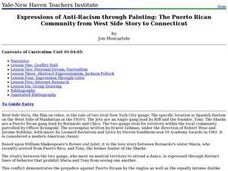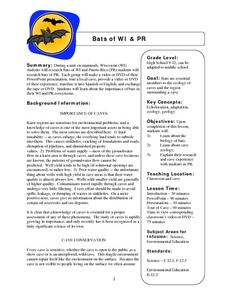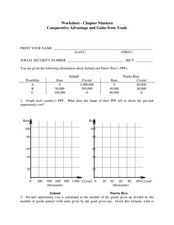Curated OER
The First Day of Congress
Students examine experiences had by representatives on the first day of Congress. They role-play the role of one of the members of Congress and they participate in opening day events. They complete worksheets to finish the lesson plan.
Curated OER
Peurto Rico and its People
Young scholars engage in discussion and activities to help them explain Peurto Rican people, their language (and how it differs from the spanish spoken in other countries), regional differences, and the different stereotypes that they...
Curated OER
Expressions of Anti-Racism through Painting: The Puerto Rican Community from West Side Story to Connecticut
Students create a graffiti wall using their own name or personal symbol. They examine their own understanding of the film as a source of inspiration and listen to the music from the soundtrack as an effective motivation. They make...
Curated OER
ESL General Knowledge Quiz 1- Fill in the Table
For this ESL general knowledge quiz worksheet, students answer 20 questions. They answer questions about bird, capital cities, money, countries, oceans, math, and geography. They are able to score 20 points by getting each answer correct.
Curated OER
Imperialism and Expansion: Part 1
Students explore the era of imperialism and expansion of the United States. In this American history lesson, students play a game regarding the U.S. attempts to expand the nation in the late 1800s and early 1900s.
Curated OER
A Nation in (Some) Context
Eleventh graders view selected websites to gain information about Puerto Rico and think about its relevance to Rafael Ferrer's "12 Variations on An 18th-century Map of Puerto Rico".
Curated OER
Share a Plan: Bullies Powerpoints
Learners create a PowerPoint presentation about bullies. Students prepare PowerPoint presentations after receiving a workshop on the Law against bullies in Puerto Rico.
Curated OER
Teeter Totter
Students explore the two types of spotted sandpipers. They create a puppet show using the spotted sandpiper from Puerto Rico and the spotted sandpiper from Alaska. Students research the habitats of the two sandpipers.
Curated OER
Bats Of WI And PR
Students investigate the bats of Puerto Rico. They conduct research in order to find information to construct a powerpoint presentation. They create a dvd of the presentation and go on a tour to a local cave to see the environment where...
Curated OER
Culture - Cuisine
Third graders become familiar with plantain recipes from Puerto Rico, Cuba, and the Dominican Republic. They describe the preparation process for cooking plantains.
Curated OER
The Geophysics And Cultural Aspects of the Greater Antilles
Students determine location by using longitude and latitude. They measure to the minute longitude and latitude of a place and select a body of land and determine its location. They approximate time zones by using every 15 degrees of...
Curated OER
Sense-sational
Students investigate the five senses. They participate in the lesson for one week with each day devoted to one sense being sight, taste, sound, smell, and touch. They also cover the concept of being part of a global community where one...
Curated OER
Part-Part-Whole
For this math worksheet, students color pictures to show that a whole number is a combination of two smaller parts. Students listen as their buddy demonstrates telling about the pictures, example: "I see one blue balloon and three red...
Curated OER
Using “And,” “But,” & “Or” Exercise
In this conjunctions practice worksheet, learners examine 10 sentences that are missing 1 word each. Students fill in the blanks with "and", "but", or "or."
Curated OER
Caribbean Music-- An Introduction
For this music worksheet, students investigate the history of music and the musical style of the Caribbean islands. Students read a 1 page information sheet about the region and its music. Students answer 8 questions.
Curated OER
Recommend a Book 2
In this book report worksheet, learners recommend a book to someone by completing 6 different statements about their selection. First, they describe the book's main subject and point. Then, students write one of the most interesting...
Curated OER
Populations in the Path of Natural Hazards
Learners read "Geographical Mobility: 1995-2000." They examine the maps in the handouts and compare them with maps from an atlas. In the second part of this instructional activity, students read "In Harm's Way." They receive three more...
Curated OER
Sustainability
Here is an in-depth, and incredibly thorough lesson plan on sustainable agricultural practices; specifically, regarding the growth of coffee. After completing and discussing a worksheet called "Thinking About Tomorrow," groups of...
Curated OER
Roberto Clemente
Have your class explore the life of Roberto Clemente using this lesson. After reading the story Roberto Clemente by Jonah Winter, learners answer cause and effect questions, classify ideas, make comparisons, and write a news article.
Curated OER
Bank Loans Money to Start Businesses
After locating Latin American countries on a world map, children read about how microbanks are loaning money to help start small businesses. Involving both current events and economics, the teacher introduces the article with a map...
Curated OER
Comparative Advantage and Gains from Trade
Using a formula and several economic scenarios, learners answer six problem solving questions and finish a graph. They will use this learning exercise to better understand comparative advantage and economic gains made through trade.
Curated OER
What about Continental Drift?
Fifth graders research the Continental Drift by researching for evidence of continental movement. The teaching explains the theory of plate tectonics and the Earth's magnetic field. They conclude the lesson by watching the video of "In...
Curated OER
Present Tense: All Verbs
Present your class with this bell-ringer activity to review conjugating verbs in the present tense. It's short and sweet, but no answers are provided.
It's About Time
Electricity and Your Community
Young scientists read and interpret a data table about energy generation around the world. Next, they use the Internet to investigate energy generation in their own state, and, finally, pupils read a passage and answer questions about it.

























